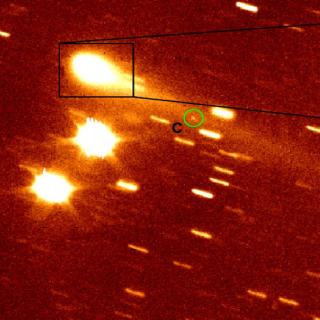Bibcode
Reddy, Vishnu; Kelley, Michael S.; Benner, Lance; Dotson, Jessie; Erasmus, Nicolas; Farnocchia, Davide; Linder, Tyler; Masiero, Joseph R.; Thomas, Cristina; Bauer, James; Alarcon, Miguel R.; Bacci, Paolo; Bamberger, Daniel; Battle, Adam; Benkhaldoun, Zouhair; Betti, Guido; Birlan, Mirel; Brozovic, Marina; Burt, Brian; Cantillo, David C.; Chandra, Sunil; Chomette, Gregoire; Coates, Ashley; DeMeo, Francesca; Devogèle, Maxime; Fatka, Petr; Ferrais, Marin; Fini, Paolo; van Gend, Carel; Giorgini, Jon D.; Glamazda, Dmitry; Holmes, Robert; Hora, Joseph L.; Horiuchi, Shinji; Hornoch, Kamil; Iozzi, Marco; Jacques, Cristóvão; Jehin, Emmanuel; Jiang, Hai; Kaiser, Galina; Kušnirák, Peter; Kuznetsov, Eduard; de León, Julia; Liakos, Alexios; Licandro, Javier; Lister, Tim; Liu, Jing; Lopez-Oquendo, Andy; Maestripieri, Martina; Mathias, Donovan; Micheli, Marco; Naidu, Shantanu P.; Nastasi, Alessandro; Nedelcu, Alin; Petrescu, Elisabeta; Popescu, Marcel; Potter, Stephen B.; Pravec, Petr; Sanchez, Juan; Santana-Ros, Toni; Serra-Ricart, Miquel; Sioulas, Nick; Sonka, Adrian; Squilloni, Alessio; Tombelli, Maura; Trelia, Madalina; Trilling, David E.; Warner, Elizabeth; Wells, Guy; Wheeler, Lorien; Wiles, Mike
Referencia bibliográfica
The Planetary Science Journal
Fecha de publicación:
6
2024
Número de citas
10
Número de citas referidas
9
Descripción
We present the results of a fourth planetary defense exercise, focused this time on the small near-Earth asteroid (NEA) 2023 DZ2 and conducted during its close approach to the Earth in 2023 March. The International Asteroid Warning Network (IAWN), with support from NASA's Planetary Defense Coordination Office (PDCO), has been coordinating planetary defense observational campaigns since 2017 to test the operational readiness of the global planetary defense capabilities. The last campaign focused on the NEA Apophis, and an outcome of that exercise was the need for a short burst campaign to replicate a real-life near-Earth object impact hazard scenario. The goal of the 2023 DZ2 campaign was to characterize the small NEA as a potential impactor and exercise the planetary defense system including observations, hypothetical risk assessment and risk prediction, and hazard communication with a short notice of just 24 hr. The entire campaign lasted about 10 days. The campaign team was divided into several working groups based on the characterization method: photometry, spectroscopy, thermal IR photometry and optical polarimetry, radar, and risk assessment. Science results from the campaign show that 2023 DZ2 has a rotation period of 6.2745 ± 0.0030 minutes; visible wavelength color photometry/spectroscopy/polarimetry and near-IR spectroscopy all point to an E-type taxonomic classification with surface composition analogous to aubrite meteorites; and radar observations show that the object has a diameter of 30 ± 10 m, consistent with the high albedo (0.49) derived from polarimetric and thermal IR observations.
Proyectos relacionados

Pequeños Cuerpos del Sistema Solar
Este Proyecto estudia las propiedades físicas y composicionales de los llamados pequeños cuerpos del Sistema Solar, que incluyen asteroides, objetos helados y cometas. Entre los grupos de mayor interés destacan los objetos trans-neptunianos (TNOs), incluyendo los objetos más lejanos detectados hasta la fecha (Extreme-TNOs o ETNOs); los cometas, y
Julia de
León Cruz